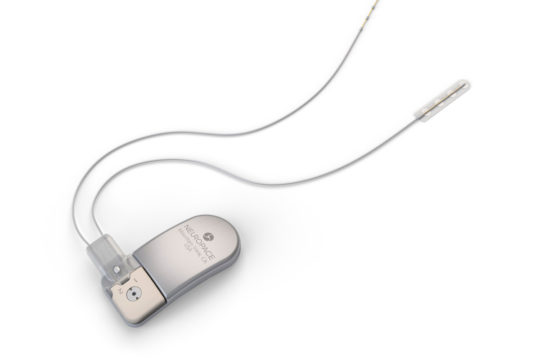Technology
 Neuromodulation for epilepsy is a new approach that can be an alternative to traditional epilepsy surgical approaches or work in synergy with them.
Neuromodulation for epilepsy is a new approach that can be an alternative to traditional epilepsy surgical approaches or work in synergy with them.
There are three types of neuromodulation currently approved for epilepsy: Deep Brain Stimulation (DBS), Responsive Neurostimulation (RNS) and Vagal Nerve Stimulation (VNS). They each work by stimulating seizure-causing brain circuits to prevent or abort seizures.
Who can benefit
Neuromodulation for epilepsy is typically used for patients with medication-refractory epilepsy who have seizures that begin in a focal manner (that is, they start in one or a very few parts of the brain), and for whom resecting that focus (through traditional neurosurgery) or ablating it (using a minimally-invasive laser) is not a good option. In some cases, patients who have had resections or ablations with less than the full desired benefit can have neuromodulation as a synergistic therapy.
How it works
Neuromodulation for epilepsy is typically used for patients with medication-refractory epilepsy who have seizures that begin in a focal manner (that is, they start in one or a very few parts of the brain), and for whom resecting that focus (through traditional neurosurgery) or ablating it (using a minimally-invasive laser) is not a good option. In some cases, patients who have had resections or ablations with less than the full desired benefit can have neuromodulation as a synergistic therapy.
How can you determine what’s best for you?
Patients who are still having seizures, despite adequate trials of two or three medications, are generally designated “refractory” and may be considered eligible for surgery, if it is suspected that the seizures are beginning in a focal manner. For some of these patients, scalp electroencephalography (EEG) and brain imaging may provide enough evidence to identify the seizure focus. However, others may require implantation of electrodes into or over the brain to map out the origin and spread of seizures. Once a seizure focus is identified with sufficient certainty, the gold standard remains resection or ablation of that focus, if possible, as a means to achieve a cure. For some patients, these more standard approaches may not be feasible or sufficiently likely to produce a cure, so neuromodulation may be considered a good option to alleviate, or in some cases, cure seizures.
Patients who are interested are evaluated by a comprehensive epilepsy team that includes highly-specialized and experienced neurologists, neuropsychiatrists and neurosurgeons. Patients collaborate with this team to express their desires, expectations and preferences so that the best, customized approach is designed to achieve their goals.